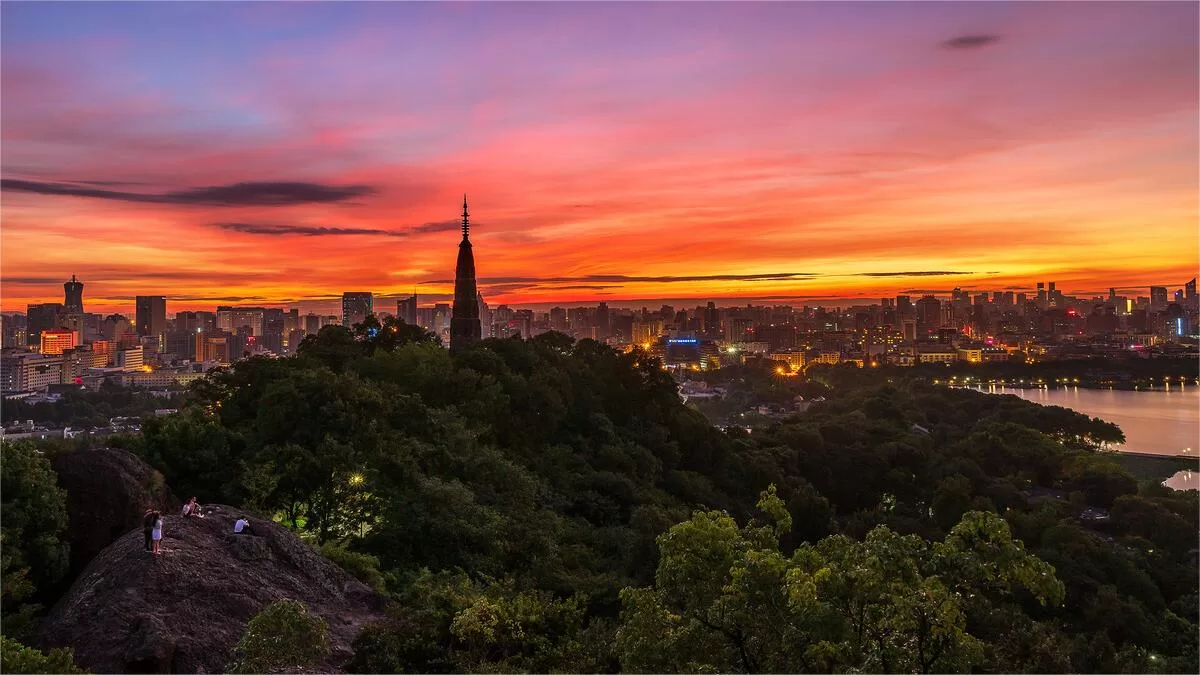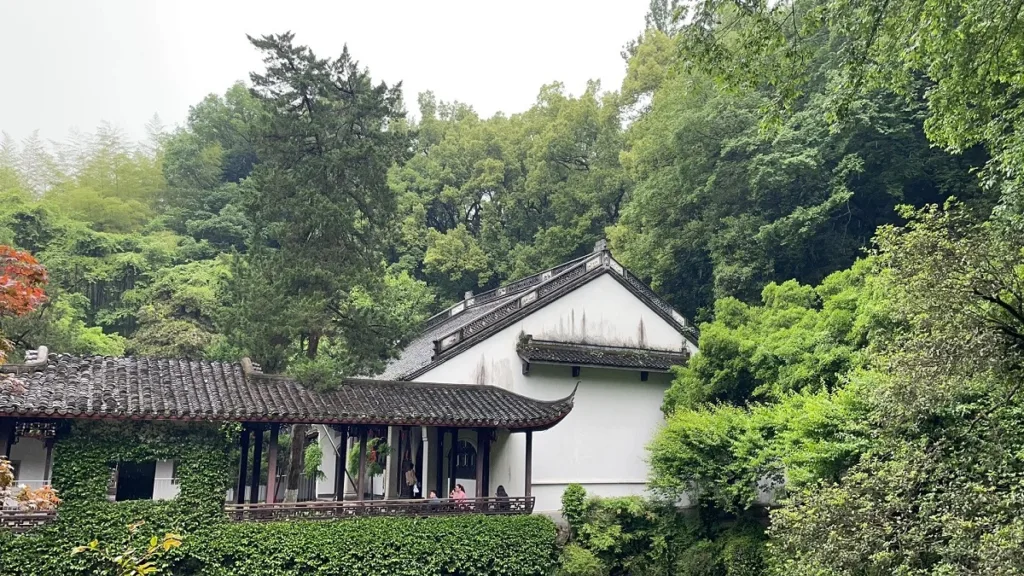Nestled on the northern bank of West Lake in Hangzhou, Baoshi Mountain (宝石山) rises to an elevation of 78 meters. Composed of igneous rocks, predominantly rhyolite and tuff, the mountain’s body contain iron oxide, resulting in a vibrant reddish hue. When illuminated by sunlight, the mountain radiates an array of colors resembling flowing clouds and sparkling gemstones, earning it the name “Baoshi,” meaning precious stone or gem.
Baoshi Mountain is adorned with peculiar peaks and unusual rocks. Before the Lai Feng Pavilion, a massive egg-shaped boulder, known as the “Shouxing Stone” or “Longevity Stone,” rests atop the summit like a fallen star. Towards the north of the peak stands the commanding “Kansong Terrace” with the inscription “屯霞” (Tunxia) engraved on its surface. Heading west leads to the fascinating Chuanzheng Cave, a collection of massive rocks stacked to form tables and benches, providing a tranquil resting spot. Behind the cave lies a meandering trail leading to the Lion Peak, offering a panoramic view of the White Causeway (Bai Di) winding like a jade belt on the mirror-like surface of the west lake, creating a picturesque landscape that invigorates the soul.
Table of Contents
- Basic Information
- Location and Transportation
- Highlights of Baoshi Mountain
- Vlog about Baoshi Mountain
- Attractions near Baoshi Mountain
Basic Information
| Estimated Length of Tour | 2 hours |
| Ticket Price | Free |
| Opening Hours | 24 hours a day |
| Telephone Number | 0086-0571-87996663 |
Location and Transportation
Baoshi Mountain is situated on the northern shore of West Lake in the Xihu (West Lake) District of Hangzhou, Zhejiang Province. Specifically located at 19 Baoshi 4th Alley, this serene and picturesque destination provides a tranquil escape. To get there, you can take bus 7, 27, 277, 510, WE1314, West Lake Inner Ring Line or West Lake Outer Ring Line, and get off at Geling Stop (葛岭站).
Highlights of Baoshi Mountain
Baochu Pagoda

Dominating the eastern summit of Baoshi Mountain stands the elegant and towering Baochu Pagoda. Originally constructed during the Five Dynasties period by Wu Yanshuang, the prime minister of the Wu-Yue Kingdom, to celebrate the safe return of King Qian Hongchu from the capital (Kaifeng), this pagoda was initially named “Ying Tian Pagoda” and later became known as Baochu Pagoda (Protecting Chu Pagoda). Initially built with nine tiers, it collapsed, and through subsequent fundraising efforts by the monk Yongbao, it was reconstructed with seven tiers. The present octagonal, seven-tiered brick pagoda, restored in 1933, stands at over 40 meters in height. Its picturesque silhouette and prominent location make Baochu Pagoda a captivating landmark on West Lake. Particularly enchanting during sunrise, when the contours of Baoshi Mountain, the gracefully poised Baochu Pagoda, and the vibrant clouds create a splendid painting in the sky.
Geling (Ge Hill)

Situated to the west of Baoshi Mountain, Geling rises over 100 meters and derives its name from the legendary Eastern Jin Dynasty scholar Ge Hong, who was believed to have practiced alchemy on the hill. Ge Hong (283-363), also known as Baopuzi, hailed from Jurong, Jiangsu. Despite early hardships, he dedicated himself to learning, becoming a knowledgeable Daoist philosopher. Ge Hong spent his later years in Hangzhou, constructing the Baopu Cottage in Baoshi Mountain’s vicinity and practicing alchemy on the hill. The site, now called Geling, preserves the historical relics of Ge Hong’s alchemical endeavors, including Alchemy Mountain, Alchemy Well, and the Baopu Cottage.
Baopu Daoist Temple

Nestled halfway up Geling, Baopu Daoist Temple is traditionally associated with Ge Hong’s alchemical practices. Originally built during the Tang Dynasty, the temple suffered destruction during wartime in the Yuan Dynasty but has since undergone multiple reconstructions in the Ming and Qing Dynasties. Today, it serves as the headquarters of the Hangzhou Daoist Association. In ancient times, Baopu Temple, alongside Huanglong and Yu Huang Temples, was considered one of the three major Daoist temples around West Lake. It stands as one of the twenty-one key Daoist temples in the country, the sole representative in Hangzhou. The name “Baopu” in Daoist philosophy embodies the concept of preserving one’s true essence, resisting worldly temptations, and avoiding disturbances caused by mundane affairs.









